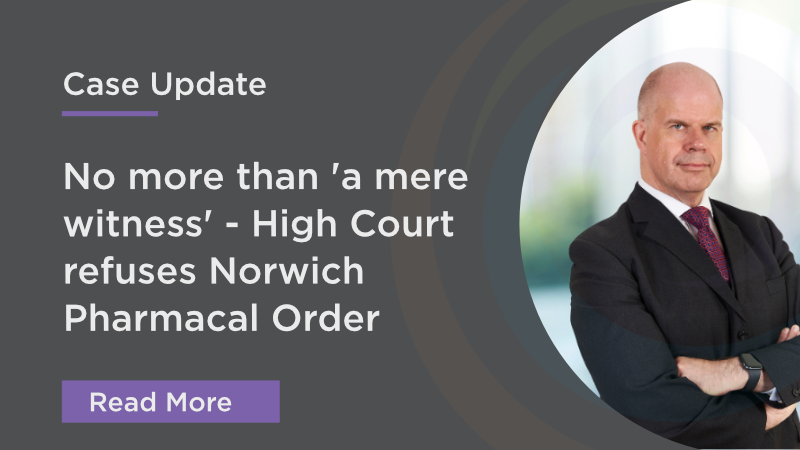A recent decision of Mr Justice Nicklin not only highlights the need for full and frank disclosure by a party seeking a Norwich Pharmacal order, but also has important implications for litigants seeking to find the true identity of the maker of anonymous online reviews or social media posts.
Davidoff and ors v Google LLC [2023] EWHC 1958 (KB), 28 July 2023
Judgment available at https://www.bailii.org/ew/cases/EWHC/KB/2023/1958.html
What happens if an aggrieved party believes that they have been legally wronged without knowing who by, but does think that a third party knows the identity of the wrongdoer? This scenario arose in Norwich Pharmacal Co. v Customs and Excise Commissioners [1974] 1 AC 133, where a company called Norwich Pharmacal became aware of imports of a product it held a patent over, but did not know who was importing it. Norwich Pharmacal believed that HM Customs and Excise knew this information, but HMCE was obliged to treat it as confidential and would not disclose it. The House of Lords held that in certain circumstances a third party such as HMCE could be required to disclose the identity of an alleged wrongdoer so as to allow a legal claim to proceed.
The test for a Norwich Pharmacal order has been refined in subsequent cases and, as set out by Nicklin J in Davidoff v Google it has 3 parts:
(1) a wrong must have been carried out, or arguably carried out, by an ultimate wrongdoer;
(2) there must be the need for an order to enable action to be brought against the ultimate wrongdoer; and
(3) the person against whom the order is sought must: (a) be mixed up in, so as to have facilitated, the wrongdoing; and (b) be able or likely to be able to provide the information necessary to enable the ultimate wrongdoer to be pursued.
Since the original Norwich Pharmacal case the rise of the Internet and social media has greatly enlarged the scope for the anonymous or pseudonymous commission of torts such as libel, malicious falsehood or passing off. As the operators of websites or social media services will often be aware of the true identity of the person making the offending posts, claimants have had recourse to Norwich Pharmacal applications to seek such information from them, as in Sabados v Facebook Ireland [2018] EWHC 2369 (QB).
In Davidoff v Google four of the Claimants were individuals associated with (some as directors of) the two corporate Claimants, which were property management companies. The Claimants complained of allegedly defamatory remarks regarding both individuals and the companies posted on the ‘Trustpilot’ review website. They had previously obtained a Norwich Pharmacal order against Trustpilot requiring it to disclose the email addresses associated with the accounts of the people who had posted the reviews. Trustpilot had provided these addresses, which were Gmail addresses hosted by Google. The Claimants thus now sought a further Norwich Pharmacal order against Google requiring it to disclose the identity or identities of the user or users of those accounts.
By their very nature, such applications are made ex parte (without notice) as regards the unknown party – after all, if they could be given notice of the application, it would not be necessary. This engages the enhanced duties of an applicant in ex parte applications to give full and frank disclosure of all matters, both positive and negative, that affect the application.
It was on this point that the issue of full and frank disclosure arose. One of the alleged libels was that the First Claimant had been expelled from a professional association, an allegation said in the Claimants’ evidence to be false. Nicklin J made an online search himself and readily found out that the First-Tier Tribunal Property Chamber had indeed recorded the fact of such expulsion in two of its decisions. On being provided with this information, leading counsel for the Claimants withdrew the application as regarded the review in question. Nicklin J was strongly critical of the Claimants and their solicitor, stating at paragraph 87 of his judgment that it was “a matter of very real concern that the Claimants put evidence before the Court, on an ex parte application, that was not true.”
This point is hardly controversial. However, Nicklin J’s primary reason for refusing the application was a more novel one that may well apply in many cases where a party is seeking a Norwich Pharmacal order for disclosure of the owner of an email address. It arose from the requirement that the third party be ‘mixed up in’ the alleged wrongdoing.
When the Claimants had obtained their earlier Norwich Pharmacal order against Trustpilot, it would not have been in dispute that Trustpilot was mixed up in the alleged libels, because it had published them on its website. But the situation regarding Google was different. The person or persons posting the reviews had only used the Gmail addresses to sign up for an account with Trustpilot. Once they had done so, they could log directly in to Trustpilot without making actual use of Google’s services. At most, the address might have been used as a login name. As Nicklin J observed at paragraph 107 of his judgement:
“The alleged wrongdoing is the subsequent use of the Trustpilot account to post the Review. In that second phase, the Defendant, in its provision of a Gmail account, has played no role; it has neither engaged in nor facilitated the alleged wrongdoing; nor has it furthered the posting of the Review. It can be tested this way. Once a person has registered for a Trustpilot account, even if the email account used for registration were to be deactivated (whether by that person or the Defendant), it would not prevent that person from posting a review on Trustpilot. If a Trustpilot account holder deactivated the registered email account, it might lead him/her to be in breach of Trustpilot’s requirement to maintain a valid email address, but again that does not involve or concern the Defendant. Once the Trustpilot account has been registered, the Defendant is, for all practical purposes, not involved in (and is powerless to control) what is posted using it. At the stage when each Review was posted, the Defendant was and is a mere witness to the anterior event of initial registration.”
The Defendant (Google) was thus not mixed up in the alleged wrongdoing, and so there was no basis for making a Norwich Pharmacal order against it. Nicklin J had little time for the Claimants’ argument that Google had nonetheless ‘facilitated’ the use of the Trustpilot account, holding that this was akin to saying that the proprietors of a garage who sold a car had in someway facilitated a subsequent collision it was involved in.
This decision will give pause for thought to parties who may have assumed that, once the email address behind an offensive or defamatory online review has been identified, the identity of its owner can be obtained almost as a matter of course via an application for a Norwich Pharmacal order. In many cases, if the offending material is hosted on a separate website, the fact that an email was used to sign up for that account will not of itself mean that the email provider was mixed up in the subsequent use of the account. Indeed, Davidoff v Google serves as a salutary reminder of the wider point that it is not enough to show that the respondent to a Norwich Pharmacal application knows the identity of the third party; even if that is undoubtedly so, that does not of itself necessarily make them ‘mixed up’ in the alleged wrongdoing.
Simon Bradshaw (2009) is the head of the Civil Team at Cornwall Street Barristers. He has a wide civil practice including Chancery, Commercial, Technology and Media law, and acted for the successful Claimant in the defamation case of Summerfield Browne Ltd v Waymouth [2021] EWHC 85 (QB).

